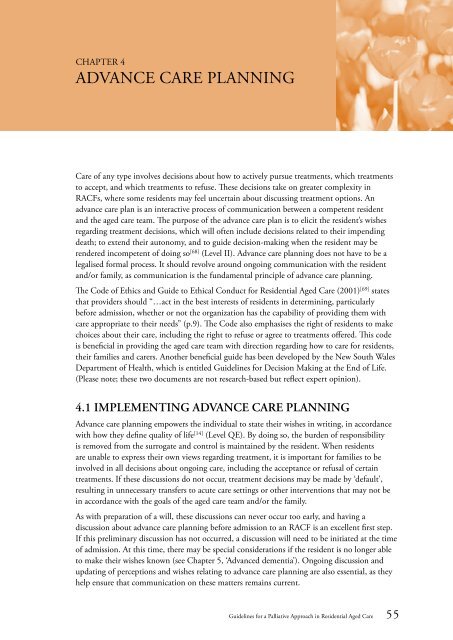Guidelines for a Palliative Approach in Residential Aged Care
Guidelines for a Palliative Approach in Residential Aged Care
Guidelines for a Palliative Approach in Residential Aged Care
Create successful ePaper yourself
Turn your PDF publications into a flip-book with our unique Google optimized e-Paper software.
CHAPTER 4<br />
ADVANCE CARE PLANNING<br />
<strong>Care</strong> of any type <strong>in</strong>volves decisions about how to actively pursue treatments, which treatments<br />
to accept, and which treatments to refuse. These decisions take on greater complexity <strong>in</strong><br />
RACFs, where some residents may feel uncerta<strong>in</strong> about discuss<strong>in</strong>g treatment options. An<br />
advance care plan is an <strong>in</strong>teractive process of communication between a competent resident<br />
and the aged care team. The purpose of the advance care plan is to elicit the resident’s wishes<br />
regard<strong>in</strong>g treatment decisions, which will often <strong>in</strong>clude decisions related to their impend<strong>in</strong>g<br />
death; to extend their autonomy, and to guide decision-mak<strong>in</strong>g when the resident may be<br />
rendered <strong>in</strong>competent of do<strong>in</strong>g so [68] (Level II). Advance care plann<strong>in</strong>g does not have to be a<br />
legalised <strong>for</strong>mal process. It should revolve around ongo<strong>in</strong>g communication with the resident<br />
and/or family, as communication is the fundamental pr<strong>in</strong>ciple of advance care plann<strong>in</strong>g.<br />
The Code of Ethics and Guide to Ethical Conduct <strong>for</strong> <strong>Residential</strong> <strong>Aged</strong> <strong>Care</strong> (2001) [69] states<br />
that providers should “…act <strong>in</strong> the best <strong>in</strong>terests of residents <strong>in</strong> determ<strong>in</strong><strong>in</strong>g, particularly<br />
be<strong>for</strong>e admission, whether or not the organization has the capability of provid<strong>in</strong>g them with<br />
care appropriate to their needs” (p.9). The Code also emphasises the right of residents to make<br />
choices about their care, <strong>in</strong>clud<strong>in</strong>g the right to refuse or agree to treatments offered. This code<br />
is beneficial <strong>in</strong> provid<strong>in</strong>g the aged care team with direction regard<strong>in</strong>g how to care <strong>for</strong> residents,<br />
their families and carers. Another beneficial guide has been developed by the New South Wales<br />
Department of Health, which is entitled <strong>Guidel<strong>in</strong>es</strong> <strong>for</strong> Decision Mak<strong>in</strong>g at the End of Life.<br />
(Please note; these two documents are not research-based but reflect expert op<strong>in</strong>ion).<br />
4.1 IMPLEMENTING ADVANCE CARE PLANNING<br />
Advance care plann<strong>in</strong>g empowers the <strong>in</strong>dividual to state their wishes <strong>in</strong> writ<strong>in</strong>g, <strong>in</strong> accordance<br />
with how they def<strong>in</strong>e quality of life [14] (Level QE). By do<strong>in</strong>g so, the burden of responsibility<br />
is removed from the surrogate and control is ma<strong>in</strong>ta<strong>in</strong>ed by the resident. When residents<br />
are unable to express their own views regard<strong>in</strong>g treatment, it is important <strong>for</strong> families to be<br />
<strong>in</strong>volved <strong>in</strong> all decisions about ongo<strong>in</strong>g care, <strong>in</strong>clud<strong>in</strong>g the acceptance or refusal of certa<strong>in</strong><br />
treatments. If these discussions do not occur, treatment decisions may be made by ‘default’,<br />
result<strong>in</strong>g <strong>in</strong> unnecessary transfers to acute care sett<strong>in</strong>gs or other <strong>in</strong>terventions that may not be<br />
<strong>in</strong> accordance with the goals of the aged care team and/or the family.<br />
As with preparation of a will, these discussions can never occur too early, and hav<strong>in</strong>g a<br />
discussion about advance care plann<strong>in</strong>g be<strong>for</strong>e admission to an RACF is an excellent first step.<br />
If this prelim<strong>in</strong>ary discussion has not occurred, a discussion will need to be <strong>in</strong>itiated at the time<br />
of admission. At this time, there may be special considerations if the resident is no longer able<br />
to make their wishes known (see Chapter 5, ‘Advanced dementia’). Ongo<strong>in</strong>g discussion and<br />
updat<strong>in</strong>g of perceptions and wishes relat<strong>in</strong>g to advance care plann<strong>in</strong>g are also essential, as they<br />
help ensure that communication on these matters rema<strong>in</strong>s current.<br />
<strong>Guidel<strong>in</strong>es</strong> <strong>for</strong> a <strong>Palliative</strong> <strong>Approach</strong> <strong>in</strong> <strong>Residential</strong> <strong>Aged</strong> <strong>Care</strong> 55
















